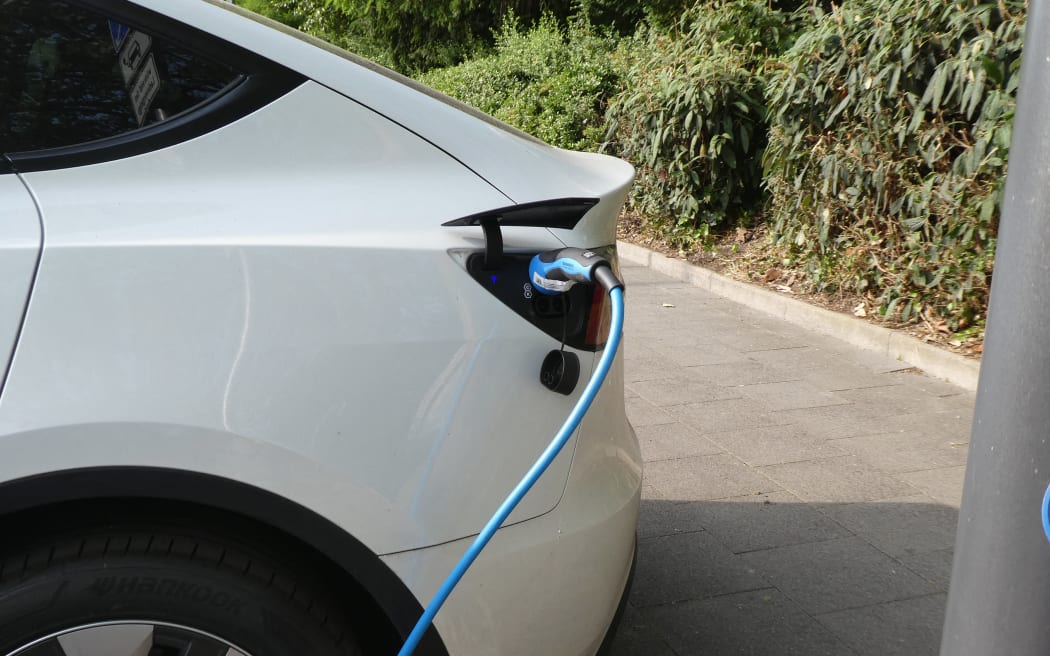New Zealand's largest electricity distributor is warning the country to hurry up with controls around charging electric vehicles or face unnecessary bills running into the billions.
A power system that is already prone to shortages like those currently forecast on Friday is facing never-before-seen demand from electric vehicles (EVs) and big data centres.
Vector is preparing for it - but the lack of laws and regulations and an Energy Ministry are in its way.
Vector chief executive Simon Mackenzie warned it was way past time to get moving.
"We've been asking for probably over four years now for someone to make a decision that if people are putting in electric vehicle charges that they ensure there's connectivity to our network.
"All of the agencies that we deal with agree it's a good thing, but no one knows who can make that decision," Mackenzie said.
They would have to build much more capacity than necessary, if EV charging was not smoothed out by Vector being empowered to schedule it.

There is huge demand from electric vehicles and big data centres. Photo: Horst Galuschka / DPA / dpa Picture-Alliance via AFP
"If we have the ability to schedule, then we have to build - between now and 2050 - the size of the Auckland network again, and if we had to build it without these scheduling and everything, it would be three times the size.
"That's billions. It's basically on current day, well over $4 billion."
Smart EV charging saves a significant amount of money while meeting the same peak demand, Vector said.
Households wanting to get an EV would also pay unnecessarily higher costs, Vector's asset management plan said.
The UK and New South Wales have recently regulated for smart scheduling of EV charging and other controls.
The government has promised there will be rules here, too, to match a roll-out of 10,000 more chargers by 2030, such as with standards to help shift home-charging away from network peaks.
Running all at once, 10,000 fast chargers would suck up almost as much power as all of Auckland.
Smoothed out, like Vector had begun successfully doing for EV public buses in Auckland, the network would cope, Mackenzie said.
But for the family car, "we are not able to implement such a scheme without regulatory support", its asset management plan said.
It needed industry standards to enable communications with chargers, and for smart chargers to connect to the management system.
"We have set connection standards ... However, our ability to monitor and enforce compliance is limited without legislative and regulatory support."
Data centre loads on electricity systems
EVs are only one new load on the power network.
The other is data centres - "the most visible new industry being attracted to New Zealand due to its largely renewable generation", according to grid operator Transpower.
Vector is planning for 10 new data centres to be running by 2034, most of them sooner rather than later, on top of seven that have started up in the last several years.
Each centre typically started by using 4MW of power, than rose to 25MW - enough to power 10,000 homes - Mackenzie said.
So far, none of them, not even Microsoft or Amazon's, was a hyperscale data centre capable of swallowing 100MW.
Nevertheless, in Albany, and Silverdale, Henderson and the central city, Vector foresees adding connections and sometimes upgrading transformers or other equipment up the line, to cope.
Its asset management plan envisages its capital spend ramping up more than 50 percent next year to about $400m, then gradually dropping back to about half that.
The plan repeatedly noted that data centres were a key factor "driving rapid and extensive load demand".
The direct costs include data centres worth around $95m and $60m in charging infrastructure for 2024-27.
However, the data centre companies, not households, would pay for all that, Mackenzie said.
They were driven by specific requests to Vector and fully recovered from customers.
"For these types of things, which is causing the growth of that asset - and whether it's a data centre or EV charging or, you know, electric ferry charging ... we basically charge the cost of that to the developer.
"They pay 100 percent of those costs."
It was Vector's job to connect them, not to choose who got connected, between, say, a subdivision or a data centre, or a factory - even though the power down the line was a finite, pressured resource. Vector has almost 600,000 connections, almost twice as many as the next biggest power distributor.
"The Electricity Authority, Commerce Commission, MBIE, ECA - there's no one that has been defined as making those kind of critical decisions," Mackenzie said.
"If we look at what's happened in the UK, they've put in a specific agency. They have essentially mandated those types of things.
"It's not a criticism of the existing agency. It's basically around saying we need to have a much more coordinated approach."
The government last month promised to set up a cross-agency taskforce to engage with industry.







